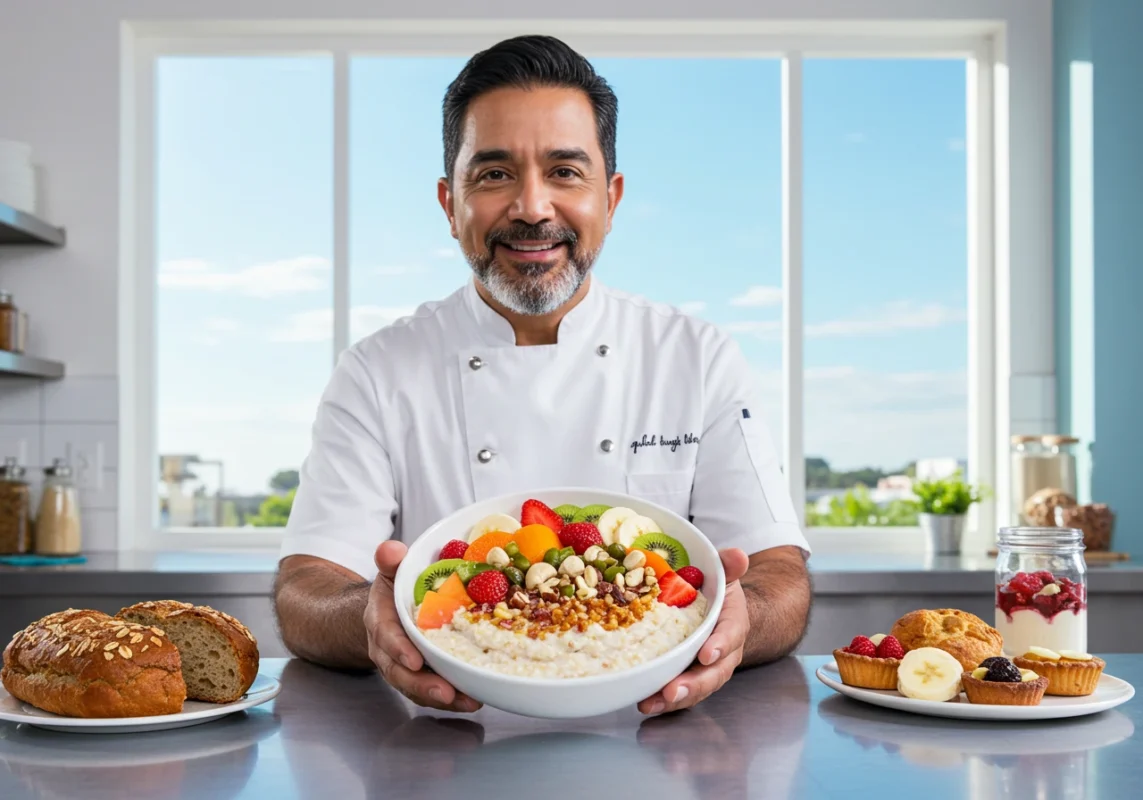In the vast universe of nutrition, breakfast reigns supreme as an essential meal that sets the tone for the day. Among the myriad options, oatmeal and bread stand out as popular staples. However, when it comes to health benefits, oatmeal often takes the crown. In this article, we’ll delve into the reasons why oatmeal may be the better option, and why oatmeal is better than bread, exploring its nutritional advantages, versatility, and more. Let’s embark on this delicious journey and explore the potential benefits of oats! 🌾
🤔 Are Oats Healthier than Bread?
When we talk about health, the discussion invariably leads us to nutritional content. A comprehensive comparison between oats and bread reveals some fascinating truths!
1. Nutritional Profile of Oats
Oats are a powerhouse of nutrition. A typical serving of plain, cooked oats (about 1 cup) contains:
- Calories: Approximately 150
- Protein: 6 grams
- Carbohydrates: 27 grams
- Fiber: 4 grams (mostly soluble fiber)
- Fats: 3 grams (mostly healthy fats)
- Vitamins and Minerals: Rich in manganese, phosphorus, magnesium, iron, zinc, and various B vitamins.
2. Nutritional Profile of Bread
In contrast, bread, especially white bread, often has a different nutritional breakdown. A typical slice of white bread contains:
- Calories: Approximately 80-100
- Protein: 2-3 grams
- Carbohydrates: 15 grams
- Fiber: Less than 1 gram (if it’s not whole grain)
- Fats: 1 gram or less
3. Fiber Content: The Winner is Clear!
Fiber plays a crucial role in maintaining digestive health, regulating blood sugar levels, and promoting satiety. Oats are exceptionally high in soluble fiber, particularly beta-glucan, which has been shown to lower cholesterol levels and improve heart health. In comparison, most types of bread—especially white bread—lack sufficient fiber.
4. Vitamins and Minerals
Both oats and whole grain bread provide vitamins and minerals. However, oats tend to have higher concentrations of certain essential nutrients, including manganese, which is vital for bone health, and phosphorus, which supports energy metabolism. Bread, particularly white bread, loses many nutrients during the refining process, making whole grain bread a better choice but still not quite matching the richness found in oats.
5. Glycemic Index: The Impact on Sugar Levels
The glycemic index (GI) is a measure of how quickly a food raises blood sugar levels. Foods with a low GI are ideal for maintaining stable energy levels. Oats have a low GI due to their soluble fiber content, which slows digestion and provides a steady energy release. On the other hand, many types of bread, especially white bread, have a high GI, resulting in quick spikes and ensuing crashes in blood sugar, which can lead to unhealthy cravings.
In light of these comparisons, it becomes clear that oats generally outrank bread in terms of nutritional benefits. 🌟
🥣 Can Oatmeal Replace Bread?
Absolutely! Oatmeal is incredibly versatile, and it can easily replace bread in various meals throughout the day. Here’s how you can make the switch:
1. Breakfast Benefits
Oatmeal is traditionally viewed as a breakfast food, and for good reason. Rather than opting for sugary cereals or processed toast, starting your day with a bowl of oatmeal is a healthier choice that keeps you feeling fuller longer. Here are some delicious breakfast ideas:
- Classic Oatmeal: Cook rolled oats in water or milk and top with fresh fruits, nuts, and a drizzle of honey or maple syrup.
- Smoothie Bowl: Blend oats with fruits and vegetables to create a thick smoothie bowl topped with yogurt and seeds.
- Overnight Oats: Combine oats, yogurt, and your favorite toppings in a jar for a quick, nutritious breakfast that’s ready when you are!
2. Lunch Reimagined
Oatmeal can easily slide into your lunch routine as well. It offers innovative replacements for typical bread-based meals:
- Savory Oatmeal Bowls: Prepare a savory oatmeal dish by cooking oats in broth and topping with sautéed veggies, an egg, and spices for a comforting meal.
- Oat Burgers: Create healthy veggie burgers using a mixture of oats, beans, and spices, forming them into patties for grilling.
3. Snack Time Delight
Instead of munching on conventional bread-based snacks, consider these oat-based options:
- Oatmeal Energy Balls: Blend oats, nut butter, honey, and add-ins (like chocolate chips or dried fruits) for a no-bake, nutritious snack.
- Homemade Granola Bars: Use oats as the base for homemade granola bars. Combine oats with nuts, seeds, honey, and chocolate for a healthy treat.
4. Using Oats in Baking
Oatmeal can also shine in baked goods! Here are some tasty options:
- Oat Cookies: Replace part of the flour in cookie recipes with oats for added texture and nutrition.
- Oat Muffins: Make muffins using oats, fruits, and healthy fats for a delightful on-the-go breakfast or snack.
In Conclusion: A Versatile Ingredient
The versatile nature of oatmeal means you can enjoy it in many forms, catering to personal taste preferences while reaping its health benefits. No need to let bread dominate your pantry—oats can fit seamlessly into every meal!
🌟 What is the Biggest Benefit of Oatmeal?
If we had to pinpoint a single standout benefit, it would be heart health and its ability to lower cholesterol levels. The soluble fiber in oats reduces levels of LDL cholesterol, protecting against cardiovascular disease. Here’s a deeper look at this vital aspect:
1. Heart Health: The Power of Beta-Glucan
Beta-glucan is a type of soluble fiber prominently found in oats, which has been extensively studied for its heart health benefits. Studies have shown that consuming oats regularly can lower cholesterol levels, reducing the risk of heart disease by as much as 10-15%.
2. Weight Management
Oatmeal is exceptionally filling due to its fiber content, helping to suppress appetite and reduce overall calorie intake. This can be particularly beneficial for those trying to maintain or lose weight. Additionally, oatmeal provides sustained energy, reducing the likelihood of unhealthy snacking throughout the day.
3. Improved Digestion
Another major benefit is the promotion of gut health. The fiber in oatmeal supports healthy digestion, preventing constipation and promoting regular bowel movements. A healthy digestive system is crucial for overall health and well-being.
4. Blood Sugar Regulation
As mentioned earlier, oatmeal has a low glycemic index, making it an ideal choice for individuals managing blood sugar levels. It can contribute to better glycemic control, reducing the risk of developing type 2 diabetes.
5. Rich in Antioxidants
Oats are also rich in antioxidants, including avenanthramides, which can help reduce inflammation and improve blood flow. This antioxidant-rich profile contributes to overall cardiovascular health and well-being.
In summary, the array of benefits that oatmeal presents, particularly concerning heart health, makes it a superior choice compared to bread.
🥄 Is Eating Oatmeal Every Day Healthy?
The answer to this question is a resounding yes! Enjoying oatmeal daily can deliver a multitude of health benefits, making it a wise addition to your routine. Here’s why:
1. Consistent Nutritional Intake
Incorporating oatmeal into your daily diet ensures a consistent intake of essential nutrients. Oats provide critical vitamins, minerals, and antioxidants that are beneficial for your overall health.
2. Optimized Digestion
As mentioned, the fiber content in oatmeal promotes healthy digestion and can prevent gastrointestinal issues. Regularly consuming oats can help maintain a healthy gut.
3. Support for Weight Loss Efforts
The satiety factor associated with oatmeal can be especially supportive for those looking to manage their weight. Feeling fuller for longer translates to fewer unhealthy cravings and smaller portion sizes at meals.
4. Balanced Blood Sugar Levels
Consuming oatmeal regularly can also aid in regulating blood sugar levels—a beneficial attribute for individuals with insulin sensitivity or type 2 diabetes. Its gradual energy release helps combat sugar crashes, keeping you energized throughout the day.
5. Improved Heart Health
Daily oatmeal consumption can help lower LDL cholesterol and promote overall cardiovascular health, reducing the risk of heart disease.
6. Variety in Preparation
One of the best aspects of oatmeal is its preparation versatility. You can flavor it in countless ways, incorporating different fruits, nuts, spices, and even savory elements to keep it exciting.
7. Mindful Eating Practices
By choosing oatmeal as a daily staple, you may also cultivate more mindful eating habits. Preparing oatmeal allows you to engage with your food in a nourishing way, encouraging you to be present during meals.
A Word of Caution: Variety is Key
While oatmeal is an excellent choice, it’s essential to vary your diet for a well-rounded intake of nutrients. Incorporate other whole grains, fruits, vegetables, and proteins to ensure you receive diverse nutrients for overall health.
❓ Frequently Asked Questions (FAQs)
1. Can I eat oatmeal instead of bread for lunch or dinner?
Certainly! Oatmeal is incredibly adaptable. You can enjoy savory oatmeal dishes like oat bowls or patties for lunch or dinner, making it a versatile meal choice.
2. Is instant oatmeal as healthy as regular oatmeal?
Instant oatmeal often contains added sugars or preservatives, making it less nutritious than rolled or steel-cut oats. Whenever possible, choose plain oats for maximum benefit.
3. Can I lose weight by eating oatmeal daily?
Incorporating oatmeal into a balanced diet can support weight loss efforts due to its high fiber content, which promotes satiety.
4. Can I prepare oatmeal in advance?
Yes! You can cook a large batch of oatmeal and store it in the refrigerator for quick reheating in the morning. Prepping overnight oats is also a popular and convenient option!
5. What are some healthy toppings for oatmeal?
Healthy toppings include fresh fruits (bananas, berries, and avocado), nuts, seeds, yogurt, nut butters, cinnamon, and even dark chocolate for a delicious flavor boost.
6. Is it better to soak oats before cooking?
Soaking oats can reduce cooking time and enhance digestibility. It may also help increase nutrient availability, making them even healthier!
7. Is oatmeal gluten-free?
Oats are naturally gluten-free; however, cross-contamination can occur during processing. If you have celiac disease or gluten sensitivity, opt for certified gluten-free oats.
🎉 Conclusion
In the age of wellness and health consciousness, oatmeal emerges as a beloved favorite that has rightfully earned its place on our dining tables. The nutritional profile of oats speaks volumes, addressing concerns about cholesterol, blood sugar regulation, and overall well-being. With the added benefits of versatility, convenience, and heart health, oatmeal clearly outshines bread in many respects.
Transitioning from bread to oatmeal doesn’t have to be intimidating; it can be a delicious journey filled with discovery! Enjoy a warm bowl of oatmeal in the morning, experienced savory delights for lunch, or treat yourself to a delectable oat-based snack.
So, the next time you ponder breakfast options, consider embracing the wholesome goodness of oats. Wave goodbye to the carb-heavy, sugar-laden bread products and say hello to the nutritious possibilities that oatmeal offers. Your body, heart, and mind will thank you! ❤️

